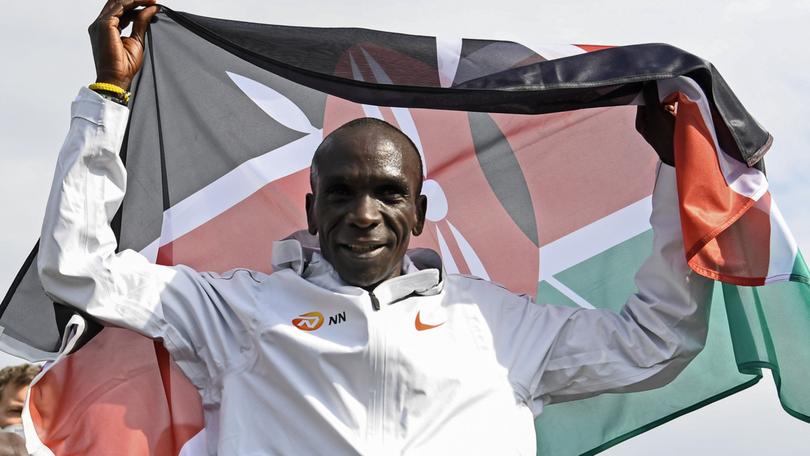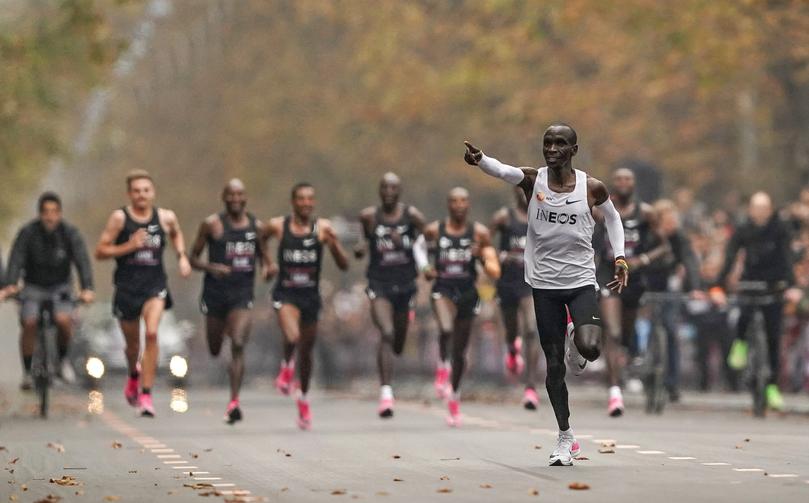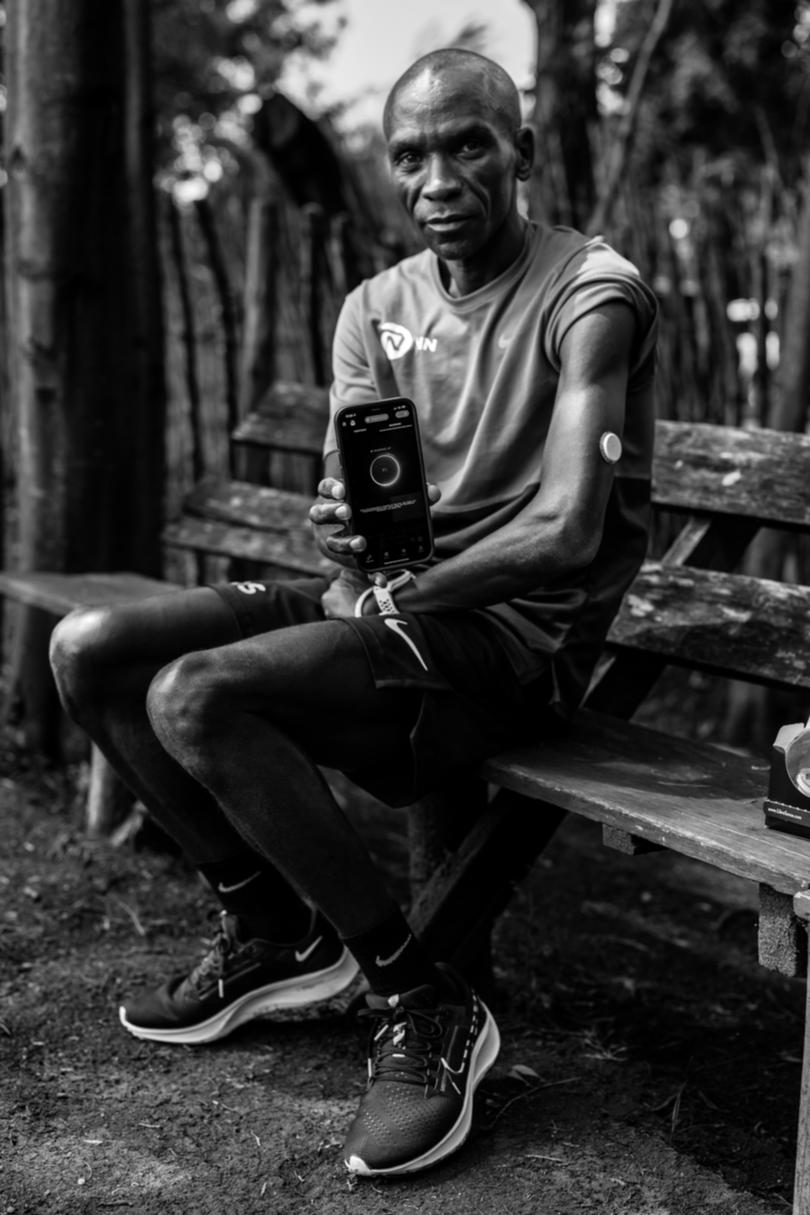Eliud Kipchoge: Even at the highest levels of marathon racing we compete in the same forum as everyday runners
As double Olympic gold medallist Eliud Kipchoge prepares to headline the 2024 Tokyo marathon he reflects on the joy of running - and how to prpare your bosy and mind to run like an Olympian.

One thing I love about running is that it opens nearly infinite possibilities for improvement. It focuses us mentally even as it frees our thoughts to wander. To me, running is freedom.
When I run, I lose myself in my mind. It’s my personal challenge, whether on my daily 30km training pursuits, while competing at races such as Abbott World Marathon Majors events (the world’s most prestigious marathons that take place in Tokyo, Boston, London, Berlin, Chicago and New York) or at the Olympics, to meet my goal. That challenge becomes my focus, and a chance to tune out worldly worries. Running is freedom because running requires our mind and body to focus, and gives us the chance to live in that focus to the exclusion of anything else.
The course may be crowded when we set off, but every runner is competing primarily with him or herself. We are all running for a cause — whether that is fitness, a podium finish, recovery from injury, for charity, just because we can, or any of millions of possibilities. We run for ourselves, and toward our goals.
Sign up to The Nightly's newsletters.
Get the first look at the digital newspaper, curated daily stories and breaking headlines delivered to your inbox.
By continuing you agree to our Terms and Privacy Policy.
This sense of individual freedom and pursuit of a goal may be why this ancient pastime appears to be more popular than ever. Social runners gather through new types of clubs from Berlin to San Francisco. Running has been a popular activity for years now, but for many trying to escape the confines of the pandemic, it helped them to break free.
In time, my greatest hope is that we become a world that is united through running, and that we run as one. My own central pursuit of marathon running is also experiencing a boom alongside casual running. Part of this boom comes down to the exciting competition to chase one of long-distance running’s greatest challenges: The sub-two-hour marathon. I’ve been pursuing this elusive mark for years and notched a time of 1:59:40 in Vienna in 2019 in a time trial (not an official competition).
With an exciting year of racing coming up including the Paris Olympics, elite runners are gearing up for another assault on this mark—one of us may well reach it in the next few months. That’s what drives me to train, to strive and to reach, even after all these years of running.
A Sport for Everyone
Another thing I like about running is that it is egalitarian: barring injury, nearly everyone can do this most basic movement, putting one foot in front of the other, straight ahead, in what becomes a meditation on speed, endurance, pain and accomplishment. Most people aren’t going for world records, even if they are competing in high-profile marathons. Marathons are also opportunities for participants with different abilities to join and compete with racers including elite racers participating in hand cycling and wheelchair racing as this sport aims to be inclusive.
Even at the highest levels of marathon racing, we compete in the same forum as everyday athletes, casual runners and elite professionals.
Running takes minimal equipment. The basics involve slipping on your running shoes, heading out the door, and getting into the groove, smoothly leaning into the first few hundred meters, and then, as you warm up, changing gears through 1k, 5k, 10k or beyond.
Today, of course, we have seemingly endless technological options to help us perform and improve. Tracking apps collect data and advanced fabrics keep us as comfortable as possible. For me, and others chasing world records and the Olympic gold, the setup is relatively advanced: I’m fortunate to be supported by a team of coaches, and by companies such as Nike and Abbott. These companies provide advanced running shoes and the latest technology to help me train. I use an Abbott biowearable sensor on my arm to continuously monitor my glucose levels so I know how I am using energy during my runs and when I need to refuel – this real-time knowledge has been a game-changer for me.
No tech can replace individual strength, however: It is our preparation, mindset and perseverance that distinguishes us. For most everyday athletes, an average pair of running shoes topped with shorts, a t-shirt and an uncluttered mind are all they need to experience the same freedom I find when I step onto the track.

Fortitude and Freedom
Beyond the technology and gear you use, what really matters is how well-prepared you are. I like to say, that I don’t believe in success at the finish line alone, but I believe in preparation and planning.
When I stand at the starting line, I do so confident that I’ve been training not just as hard as I can, but with strategy and perseverance. Success comes from the work and the thought you put into your run in the weeks, months and years before you ever toe the line.
Plenty of resources can provide training strategies and tactics, and each runner will learn what works for them. What I can add from experience is that there will always be pain and there will always be resistance. To succeed, you must embrace that pain—lean into it and learn to enjoy it, because pain is the gateway to achieving great things (I don’t mean to say that you should ignore all pain – don’t run if you’re unwell or without seeking medical advice where needed).
Leaning into the pain, pushing through the resistance to beat your last time, to finish the last kilometer, to go a few more steps—these are the mental challenges that accompany the physical. In a long run such as a marathon, the deeper you get into the run, the more the mind takes over from the body. Perseverance becomes a mental challenge, surmountable with tactical thinking: Make it to the next intersection, the next water stand, the next banner.

This struggle, for me, is a joy. It’s where I find my focus and it’s how I want to live: Improving a little more each day, connecting with the world and with my fellow runners through our shared experience of pushing the human body to do what was once thought impossible.
As we lace up in the new year, I hope you will join me, even if it’s just a few kilometres on Sunday morning. That modest start can put you on the road to your local marathon event or even one of the Abbott World Marathon Majors, and to achieving things you might never have thought possible.
Put in the work, and I’ll see you at the starting line.
Eliud Kipchoge is a two-time Olympic champion and among the greatest-ever marathon runners.
